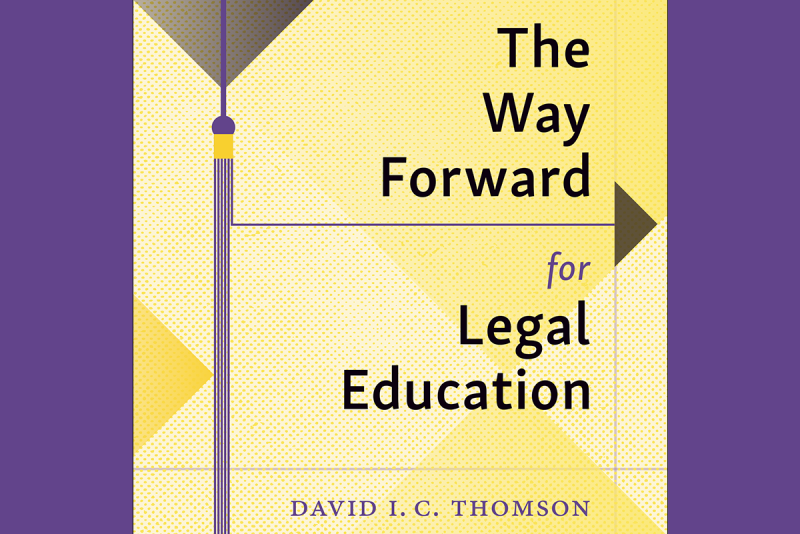David Thomson Proposes Bold Ideas for the Future of Legal Education

As David Thomson sees it, the American legal profession—and legal education—must confront the challenges to their legitimacy that result from systemic racism and the ever-rising costs of both legal education and professional legal services. In his new book, The Way Forward for Legal Education, Thomson, Professor of the Practice of Law and John C. Dwan Professor for Online Learning at the University of Denver Sturm College of Law, presents some bold ideas for how law schools can start to address these challenges, and ultimately strengthen and insulate democratic institutions in America.
First, Thomson proposes that the LSAT be eliminated as a test for admission to law school, and advocates for the use of holistic admissions criteria that more closely reflect the skills needed to practice law rather than rewarding a student’s aptitude at taking high-speed, high-stakes tests. As Thomson notes, “because it has been shown that LSAT scores are disproportionately lower for many ethnic groups, this has essentially acted as a barrier to the kind of inclusive profession that many of us think we need to solve the legal problems of the twenty-first century.” Rather than attempt to design a standardized test that avoids the discriminatory impact of the LSAT, Thomson advocates for an increased reliance on undergraduate GPA, a more intensive in-person interview process, and for admitting a much larger pool of first-year law students, which ties into another bold idea: redesign the first year of law school.
By transforming the first year of law school into a hybrid online format, Thomson envisions being able to admit a much larger cohort of students, at a greatly reduced cost. Rather than creating an expectation that all of those admitted students would pursue a J.D., this new model would offer multiple tracks toward both a degree, and toward becoming a legal professional. After the first year, students who both want a J.D. and demonstrate success in a rigorous test of substantive law and writing skills could advance to a second year, while students who either do not want a J.D. or do not perform well enough to continue would be able to obtain a master’s degree in American law. Some of the latter group might want to obtain additional training to become a Limited License Legal Technician (LLLT) and be able to offer professional legal services that do not require the efforts of a fully licensed attorney.
Providing legal services through an LLLT rather than a full attorney would go a long way toward addressing what Thomson sees as “perhaps the greatest threat to the legitimacy of the legal profession today”—unmet legal need. In an interview with Thomson, he notes that “the medical profession figured this out 50 years ago. Have you ever been to a nurse practitioner? Or a physician’s assistant?” In addition to reducing the cost burden on society for obtaining legal services, this master’s degree/LLLT track would greatly reduce the debt that those students acquire in law school. At a time when the average cost of a legal education exceeds $200,000, and only about three-quarters of graduating J.D. students successfully pass the bar exam each year, such a change would both benefit society and make the proposition of pursing a legal education far less daunting for many students. It would also open the professional field to individuals who have traditionally been excluded or underrepresented.
These are far from the only suggestions that Professor Thomson has for the field of legal education, a topic in which he is an expert: in his 2009 book, Law School 2.0: Legal Education for a Digital Age, Thomson reviewed the myriad ways that technology has been reforming higher education in general, and the potential it offers for legal education specifically. Fourteen years on, technology has become better at doing all the things that Thomson saw coming and offers even greater potential for facilitating the reforms that he sees as next steps. Over the past few weeks, not a day goes by when artificial intelligence systems such as ChatGPT and Microsoft’s forthcoming AI-powered search engine are not in the news. Thomson, however, is not worried about AI replacing lawyers or the efforts of professors to have students write their own papers. “It could help us as teachers in various ways we have yet to explore or understand.”
For Professor Thomson, the more urgent, and fundamental challenges for law schools are to make changes that address and mitigate legal education’s role in perpetuating systemic racism, and to strengthen and defend democratic institutions by expanding the availability of legal services and democratizing legal education.
David I.C. Thomson is Professor of the Practice of Law and John C. Dwan Professor for Online Learning at the University of Denver Sturm College of Law. His book, The Way Forward for Legal Education, is available from Carolina Academic Press in both paper and electronic format.



